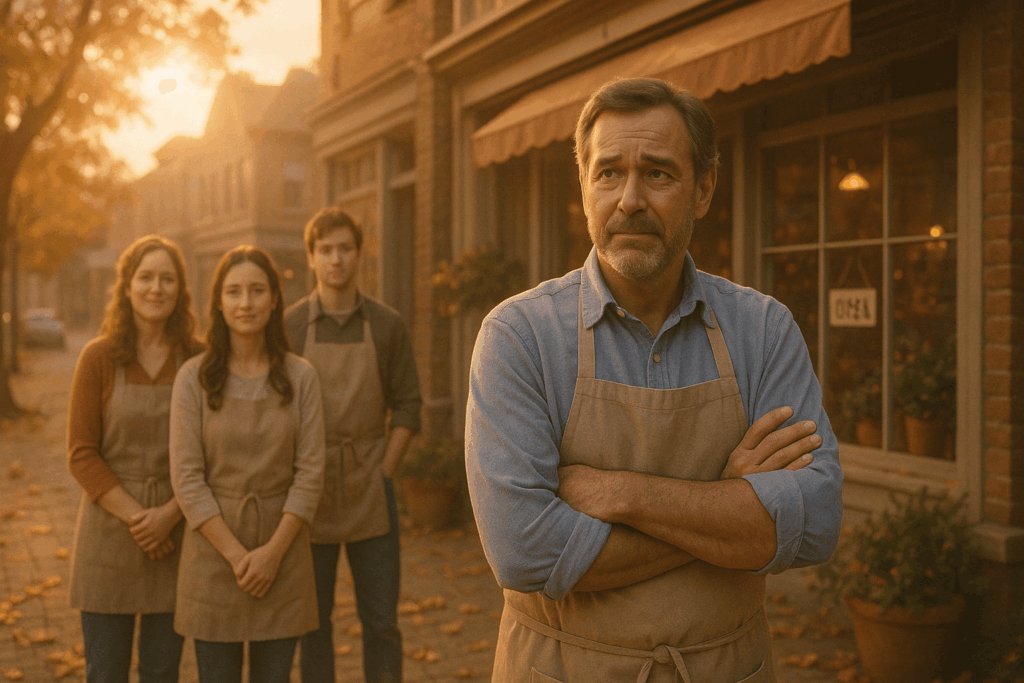When “Enough Coverage” Isn’t Really Enough

Brian runs a growing HVAC business in the suburbs—three trucks on the road, a warehouse full of inventory, and a handful of employees he trusts like family. He thought he had his bases covered. General liability? Check. Commercial auto? Yep. Workers’ comp? In place.
But when one of his drivers accidentally T-boned a luxury SUV on a job call, the costs spiraled. Medical bills. Legal fees. A claim that blew past his auto policy’s limits. That’s when Brian learned the hard way: having “just enough” coverage wasn’t enough at all.
Commercial umbrella insurance isn’t something most business owners think about—until they’re wishing they had it. It’s the extra layer that sits quietly in the background, ready to catch what your primary policies can’t handle. In this post, we’ll break down exactly how it works alongside your existing coverage, where it fits in, and why skipping it could leave your business exposed at the worst possible moment.
Let’s walk through what commercial umbrella insurance really does, who needs it, and how it protects what you’ve built when the unexpected hits.
What Is Commercial Umbrella Insurance—And Why Should You Care?
Let’s be honest—insurance can feel like alphabet soup. General liability, auto liability, property, workers’ comp… if you’re a business owner like Brian, you’ve probably signed off on a stack of policies without ever being 100% sure what’s really covered.
That’s where commercial umbrella insurance comes in.
At its core, this policy isn’t meant to replace anything. It’s designed to pick up where your other insurance stops. Think of it as a backup generator. Your regular policies run the show day-to-day, but when things go sideways—and your limits run dry—this is the protection that keeps your business from going dark.
Here’s how it works:
- Scenario A: You carry $1 million in general liability. Someone gets seriously injured at your storefront, and the claim hits $1.5 million. Without commercial umbrella insurance? You’re personally responsible for that $500,000 gap.
- Scenario B: Your employee crashes a company truck into a luxury car. Your commercial auto policy covers up to $300,000. The claim hits $600,000 after legal and medical costs. That $300,000 difference? It either comes from you—or your umbrella policy, if you have one.
This isn’t just about catastrophic accidents, either. Lawsuits, settlements, and court-ordered damages add up fast. Even something as common as a slip-and-fall can cost more than your primary policy covers.
Commercial umbrella insurance offers peace of mind in a world where claims are getting larger and verdicts aren’t going in favor of business owners. It gives you breathing room—not just to protect your balance sheet, but to keep your doors open during the fallout of a serious incident.
If you’ve ever wondered whether your current policies would actually hold up in a worst-case scenario, this is the backup plan you didn’t know you needed.
How Commercial Umbrella Insurance Layers Over Your Existing Policies Like a Safety Net
Let’s say Brian has a solid lineup of coverage: general liability for accidents, commercial auto for his fleet, and workers’ comp for his crew. Sounds like a tight setup—and it usually is.
Until the day something big happens.
That’s when commercial umbrella insurance kicks in—not as a replacement, but as a safety net that catches what your other policies can’t.
Here’s how the layering actually works:
- Your base policies respond first.
Whether it’s general liability, auto, or employer’s liability, those policies handle the claim up to their set limits. So if your general liability covers $1 million, it pays out that amount before anything else happens. - When those limits are maxed, umbrella insurance takes over.
If a claim exceeds your primary policy’s limits, commercial umbrella insurance pays the difference—up to its own policy limit. This could be an extra $1 million, $5 million, or more, depending on your needs. - It doesn’t duplicate coverage—it extends it.
One of the biggest myths is that umbrella insurance overlaps or replaces your base policies. It doesn’t. It simply gives you more room to breathe when your base coverage hits the ceiling.
A Simple Analogy:
Think of your existing insurance policies like the walls of a dam. They hold back the water—up to a point. But when the storm hits and the water rises past the wall, that overflow has to go somewhere. Commercial umbrella insurance is the extra wall behind the first one. It keeps the flood from reaching your business, your savings, or your personal assets.
Where it typically applies:
- General liability
- Commercial auto liability
- Employer’s liability (part of your workers’ comp policy)
- Hired and non-owned auto liability
- In some cases, product or advertising liability
For someone like Brian, who has contracts, property, vehicles, and a team to worry about, these limits matter. He might never expect a $2 million claim—but if it happens, this one policy could make the difference between a bad day… and a business-ending disaster.
The Surprising Gaps It Can Help Fill (That You Might Not See Coming)
Brian didn’t think twice when his buddy Rick called in a panic. A customer had slipped on the wet tile just inside Rick’s restaurant. It seemed like a minor incident—until the medical bills, lost wages, and legal fees rolled in. His general liability limit? Maxed out in weeks. The rest? Came out of pocket.
Here’s the thing: most business owners don’t realize just how fast a single claim can blow through what they assumed was “good coverage.” That’s the danger. Not the stuff you do see—but what you don’t.
Commercial umbrella insurance is built for those moments.
Common Gaps That Catch Business Owners Off Guard:
- Lawsuit Defense Costs
Legal fees alone can stretch into six figures—even if you win. Your primary policy might burn through its limit just covering your attorney before it even gets to a judgment. Umbrella coverage helps absorb what’s left over. - Auto Accidents Involving High-Value Vehicles or Injuries
A business-owned pickup rear-ending a luxury car? It’s not just vehicle damage—it’s medical bills, pain and suffering, and lost income for the other party. That adds up quickly, often beyond your auto policy limits. - Injuries on Business Property
One fall. One broken hip. One long-term disability claim. These are the “hidden landmines” Brian worries about now, after watching Rick nearly lose his business. - Employees Suing Over Job-Related Injuries
In certain cases, employer’s liability (separate from workers’ comp) becomes relevant. If someone sues for negligence or unsafe work environments, umbrella insurance can step in once that limit is exhausted.
What makes these gaps so dangerous is how fast they sneak up. You don’t get a countdown clock when a claim starts climbing. You just see the bill.
That’s why commercial umbrella insurance isn’t just about buying more coverage—it’s about buying time and options. It gives you the breathing room to focus on running your business without wondering what happens if that next letter from an attorney shows up in your mailbox.
Who Needs Commercial Umbrella Insurance Most—And How Much Coverage Makes Sense?
If you’re like Brian, you probably assume umbrella insurance is something big corporations worry about. After all, you’re not running a Fortune 500 company—you’re running a local business with a team, a few vehicles, and a lot of responsibilities.
But here’s the truth: commercial umbrella insurance isn’t about how big your business is. It’s about how exposed you are when something goes wrong.
Businesses That Should Seriously Consider Umbrella Coverage:
- Contractors & Tradespeople
You’ve got equipment on job sites, subcontractors in the mix, and trucks on the road. One accident can bring lawsuits from multiple angles. - Restaurants & Retail Shops
Foot traffic means slip-and-fall risk. Add in alcohol service or hot surfaces, and the potential for large claims grows fast. - Professional Services
Even if you don’t deal with physical injuries, liability from advertising, defamation, or accidental data loss can spiral into costly litigation. - Property Owners or Real Estate Investors
If tenants, vendors, or guests are on your premises, you carry a legal duty to maintain safety—and you can be sued if you fall short.
Even if you operate from a desk and rarely see customers in person, your exposure might be higher than you think. Lawsuits don’t care about your revenue—they care about how much someone thinks they can collect.
How Much Coverage Do You Need?
This is where many business owners guess—and often guess low. A typical commercial umbrella insurance policy starts at $1 million in coverage, but higher limits are available and often affordable.
Here’s a simple rule of thumb:
- Look at the value of your business assets (including property, inventory, and equipment).
- Consider your risk exposure (vehicles, foot traffic, client interaction, etc.).
- Think about what it would take to rebuild if a claim cleaned out your current policies—and then some.
Many carriers offer coverage in $1 million increments, often with surprising affordability. The real question isn’t “Can I afford it?” It’s “Can I afford to be without it?”
Brian realized his business—small but growing—was sitting on a financial fault line. He didn’t need a $5 million lawsuit to ruin everything. He just needed one bad day. Now, with the right umbrella policy in place, he’s not playing defense anymore—he’s protected.
Don’t Let a Single Lawsuit Wreck Your Business
Brian didn’t set out to become an expert in insurance—he just wanted to protect what he built. Like most business owners, he thought he had it covered… until one unexpected claim nearly proved him wrong. The truth is, even the best-laid plans can crack under pressure. That’s why adding commercial umbrella insurance isn’t just smart—it’s necessary. It’s the quiet backup that steps in when your other policies hit their limits, giving you peace of mind when it matters most. If you’re serious about protecting your business, your livelihood, and your future, this is one step you can’t afford to skip.
